home | metro silicon valley index | movies | current reviews | film review

Photograph by David Lee
MAKING A POINT : Denzel Washington plays a debate coach in, oddly enough, 'The Great Debaters.'
Talking Points
Denzel Washington leads a team of plucky arguers to victory in 'The Great Debaters'
By Richard von Busack
THE IDEA OF DEBATE as a blood sport is fair enough. Or it would be if the craft of argument weren't in grave decline: no one has the attention span for anything more than a definitive sound bite. Unfortunately, when cinema takes on debate, it's always done the same way: as a sports story, the nerdiest version of a triumphant band of rejects leading to the fixed fight with the heavyweights. Generally, I would describe the 1989 film Listen to Me as the most pea-brained film I have ever seen. In it, a plucky small college armed with such silver-tongued orators as Jami Gertz and Kirk Cameron successfully convinces the Supreme Court that there needs to be a waiting period for abortions. The Oprah-produced The Great Debaters has a little more integrity.
The film is based on the real-life story of Wiley College of Marshall, Texas, and how it overcame racism and poverty to make it up to the National Championship in Harvard. (The real triumph took place at the less-hallowed USC.) As a director, Denzel Washington, is thriftier with the schmaltz than he was in Antwone Fisher. As an actor, he uses his firmness as real-life coach Melvin B. Tolson to inspire some discipline in the champs. As the team travels from college to college, a love triangle develops between the brilliant but undersized James Farmer Jr. (Denzel Whitaker, who is apparently related to neither of this film's leads); the poised Samantha (Jurnee Smollett); and the hunky, raffish and demon-prone Henry Lowe (Nate Parker).
Tolson is a political activist, organizing the local sharecroppers in a tenant's union, which stirs up the town into violence. It also draws the attention of both Marshall's white sheriff and an important professor at Wiley, Dr. James Farmer Sr. (Forest Whitaker). In one scene, Whitaker and Washington clash over the duty of a Christian to find social justice. Their fierce acting dispels the miasma of earnestness laid down by producer Winfrey. For a change we see a couple of the finest actors there are on their toes. So often, both Whitaker and Washington surround themselves with good-looking protégés, instead of the kind of actors who'll really stoke them up. The young Denzel Whitaker is no slouch. He does a good job of living up to his ambitious stage name. He has learned from the real Washington's incomparable watchfulness and wariness; he is particularly good in a scene when James Jr. realizes that his grave, honorable father, the tremendously respectable preacher, is just as subject to the humiliation of racism as anyone else. Unfortunately, he learns this lesson in a melodramatically staged scene on a rural back road. The Great Debater's by-the-book script needs everything young Whitaker can give it. The team's arguments against racism and segregation seem like self-evident truths, but they aren't. I'd like to see a good argument for segregation in a film, only because I want to see that argument so soundly defeated that it never rises up again. That doesn't happen here. While the early scenes stress how much logic one needs to win any debate, the movie ends like every other debate movie I've seen: best sob story wins.
![]() THE GREAT DEBATERS (PG-13; 123 min.), directed by Denzel Washington, written by Robert Eisele and Jeffrey Porro, photographed by Philippe Rousselot and starring Denzel Washington and Forest Whitaker, plays valleywide.
THE GREAT DEBATERS (PG-13; 123 min.), directed by Denzel Washington, written by Robert Eisele and Jeffrey Porro, photographed by Philippe Rousselot and starring Denzel Washington and Forest Whitaker, plays valleywide.
Send a letter to the editor about this story.
|
|
|
|
|
|